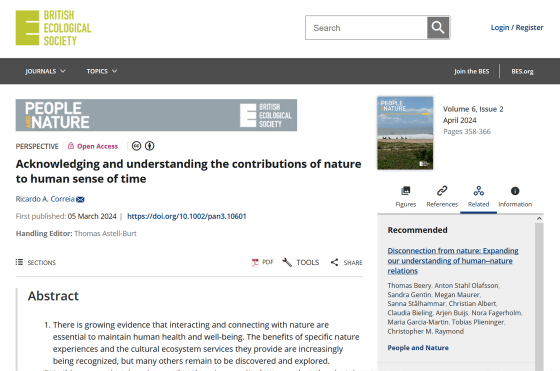Research shows that time really does seem to pass more slowly when you're in nature

Travel agencies and tourism organizations often use slogans like, 'Get away from the busy city and spend some relaxing time in nature.'
Acknowledging and understanding the contributions of nature to human sense of time - Correia - 2024 - People and Nature - Wiley Online Library
https://besjournals.onlinelibrary.wiley.com/doi/10.1002/pan3.10601

How nature can alter our sense of time
https://theconversation.com/how-nature-can-alter-our-sense-of-time-225316
Modern people perform a wide variety of tasks related to work, family, social interactions, hobbies, etc. every day, and many people feel that they don't have enough time no matter how efficiently they complete their tasks. The development of digital technology has also exacerbated the feeling that time is passing too quickly, as we are always connected to our workplaces and friends.
To investigate the effect of 'nature' on human perception of time, Correira analyzed several studies in which subjects performed the same tasks in urban and natural environments and examined how they perceived the passage of time.
As a result, multiple studies have consistently shown that people feel that time passes more slowly in nature than in urban areas. For example, research has shown that people feel that walking in natural areas is longer than walking in urban areas, and that people performing tasks that require attention feel that time passes more slowly in nature. Research has also shown that spending time in nature reduces people's impulsivity , allowing them to make choices that will give them longer-term rewards even if they have to postpone momentary gratification.
This change in our sense of time not only affects our perception of the present moment, but also the past and future, and spending time in nature helps shift our focus from immediate matters to future needs, allowing people to view life from a longer-term perspective, prioritizing their actions and achieving their long-term goals.

The way humans experience time is influenced by our internal biological state as well as the external environment and events we are exposed to, so even if the time is actually the same, emotions such as stress, anxiety, and fear can distort people's perception of time.
Being in nature has a relaxing effect, reducing
Ruth Ogden, a professor of psychology at Liverpool John Moores University in the UK, and her colleagues argued that 'green infrastructure' such as trees and parks throughout the city is essential for people in urban areas who find it difficult to connect with nature.

Related Posts:
in Science, Posted by log1h_ik







